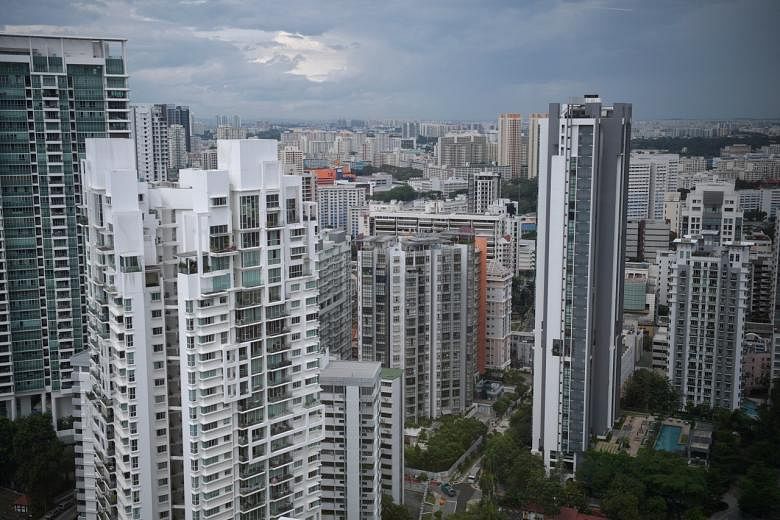SINGAPORE - Singapore's property market caught its first chill from the coronavirus with quarterly private home prices declining for the first time in a year, but market watchers said they are not expecting a sharp fall in prices going forward.
According to flash data from the Urban Redevelopment Authority (URA) on Wednesday (April 1), prices of private residential properties dropped 1.2 per cent in the first three months of the year from the previous quarter.
It is the first quarterly drop since prices declined 0.7 per cent in the first quarter of last year. Private home prices rose 2.7 per cent last year in a modest recovery from the July 2018 cooling measures, with prices up 0.5 per cent in the final quarter of 2019.
The quarter-on-quarter fall in prices was broad-based, across both landed (-1.7 per cent) and non-landed (-1 per cent) segments. It was also across all regions. Prices of non-landed homes in the prime areas or core central region (CCR) fell by 1.5 per cent, prices in the city fringes or rest of central region (RCR) dipped by 0.5 per cent, while those in the outlying areas or outside central region (OCR) declined by 1 per cent.
Year-on-year, overall property prices are still up 2.2 per cent.
Market watchers said the impact of Covid-19 on the property market as Singapore heads into a recession will depend highly on how long the outbreak lasts and when it will be contained, while noting the hefty support from the Resilience Budget which should help stem job losses and just-announced consumer loan relief measures.
The property market will likely keep afloat as long as unemployment remains low and people are able to service their mortgages, said Ms Christine Sun, head of research and consultancy at OrangeTee & Tie.
Ms Sun said she is not expecting dramatic price corrections in the coming months despite the worsening Covid-19 outbreak. "Many property measures have already been put in place over the past years to ensure financial prudence among buyers. The possibility of many homeowners slashing prices or defaulting on housing loans is not high," she said.
Having learnt from past financial crises, deeper-pocketed developers may not see a need to adjust prices drastically now, as their balance sheets are still relatively healthy, added Ms Sun.
Mr Wong Xian Yang, Cushman & Wakefield's senior manager for research, Singapore and South-east Asia, said prices may prove to be more resilient as compared to previous recessions. During the 2008-2009 Global Financial Crisis, for example, overall property prices fell by 24.9 per cent over four consecutive quarters.
He noted the latest measures allowing eligible individuals to apply to defer their property loan payments up to the end of 2020. "This indirectly helps support current prices as property owners have more breathing space to navigate any cashflow difficulties," he said.

He added: "For now, fire sales are not expected, as unemployment rates remain relatively low and most property owners are not under huge pressure to sell. Furthermore, the majority of property sales over the last few years have been driven by local owner occupiers and investors, the majority of which are holding for the long term.
"Furthermore, if prices show signs of spiraling downwards, the government can potentially ease cooling measures to stimulate demand. As such, we may not see a sharp drop in prices like in previous recessions."
Mr Ismail Gafoor, CEO of PropNex Realty, said that under current market sentiment, he is expecting property prices to drop by 2 per cent to 3 per cent this year. Genuine buyers will take advantage of the "silver lining" of lower interest rates to pick up "rightly priced" projects, he said. The Singapore inter-bank offered rate (Sibor), to which many home loans are pegged, has plunged in recent weeks in response to the US Federal Reserve's emergency moves to slash its key rate to near zero.
Mr Desmond Sim, CBRE's head of research, South-east Asia, said prices could correct by 5 per cent to 8 per cent in 2020, given the 1 per cent to 4 per cent economic contraction officially forecast . "While we expect demand for housing to remain, current economic sentiments may put some buyers' decision on hold," he said.
He said his forecast is also based on the view that the CCR, where homes are most expensive, might see larger adjustments due to the high inventory of project launches for sale, and the slowdown of Chinese home buyers. He also expects developers "to be more flexible in their pricing expectations", especially when showflats would fall under enhanced social distancing measures.
The URA cautioned that the flash estimates are compiled based on transaction prices given in contracts submitted for stamp duty payment and data on units sold by developers up till mid-March. Past data have shown that the difference between the quarterly price changes indicated by the flash estimate and the actual price changes could be significant when the change is small, it said. It thus advised the public to interpret the flash estimates with caution.
The data will be updated on April 24 when URA releases its full set of real estate statistics for the first quarter.












